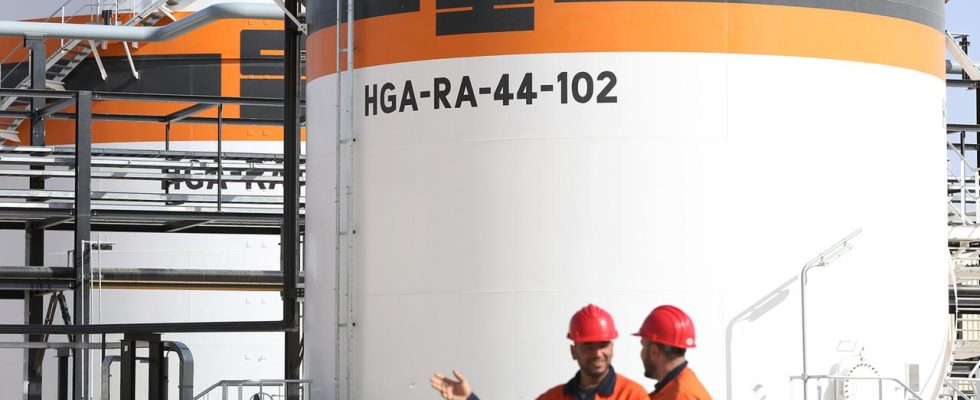German politics actually relies on green energy. Nevertheless, a German gas trader has now signed a contract in Algiers for the first time – and some are asking themselves: why?
Nothing but sand and dunes can be seen – but flames flash when flying over the Algerian Sahara. Hassi R-Mel, about 500 kilometers south of Algiers, is one of the largest gas fields in the world. And for Algeria, Africa’s largest gas exporter, this gas field is one of its most important economic factors.
The pipelines to Spain and Italy start here. From Beni Saf on the Algerian coast to Almeria on the Spanish coast, the pipeline lies under the Mediterranean – the coasts there are just 200 kilometers apart. And so Spain covers a good third of its gas needs in the North African country.
Algeria is not yet a top trading partner for Germany: in 2023, according to the German Chamber of Commerce and Industry (DIHK), the country ranked 62nd with a trade volume of 3.6 billion euros.
Algeria benefits from the energy crisis in Germany
Trend upwards? Given the energy crisis, Algeria could become more important. Africa’s largest country by area also has great potential for solar energy and green hydrogen. Green Economics Minister Robert Habeck also had this market in mind during his visit to Algiers at the beginning of February. The fact that a German trader signed a gas supply contract there for the first time, the Leipzig gas trader VNG, may seem surprising from a German perspective. For Germany, gas is more of a bridging technology.
For Algeria, the contract is a “historic deal,” exults Choeib Boutamine, an energy consultant from Algiers. “Spain and Italy are already benefiting greatly from Algerian gas and are in a better position than Germany. Germany should get involved and expand cooperation with us here on natural gas and energy.”
Gas – a raw material of yesterday?
Andreas Goldthau researches energy security and climate change at the University of Erfurt. Natural gas will definitely be needed for a longer period of time, he said daily News. But you have to see where. “In the EU, gas demand will fall by around 50 percent by 2040. And then gradually down to zero.”
In the emerging countries of Asia, for example, but also in Africa, the situation is the other way around: “The demand for gas will increase until these countries also switch to green forms of energy.” Goldthaus’ explanation: Countries that started industrialization late can therefore phase out fossil fuels later.
Forum gas exporting Countries want to continue investing
The countries from which gas flows to the world markets recently became clear at the Forum of Gas Exporting Countries (GECF) in Algiers. The forum, founded in Iran in 2001, brings together twelve countries that are home to almost 70 percent of the world’s natural gas reserves. Apart from Russia and Algeria, these include Iran, Qatar and Libya. Not exactly Europe’s closest political friends. Not a member of the forum: the world’s largest gas producer, the USA, and neither is China.
In their “Algiers Declaration,” the countries postulate the necessity of natural gas in the fight against energy poverty and call for further investment in their raw material. The forum condemns “unilateral economic restrictions” as well as the argumentative use of climate change to hinder investments. It is therefore a self-confident vote for the fossil fuel natural gas and against sanctions. Russia and Iran are two countries in the forum that are on the sanctions list have a firm place in the EU.
The Forum of Gas Exporting Countries (GECF) includes twelve countries that have almost 70 percent of the world’s gas reserves.
Conflict between business and politics
So can Germany do gas business with Algeria without hesitation? A country that ranks 125th out of 177 in a 2021 ranking by the University of Würzburg on the quality of democracy and is internationally criticized by Amnesty for its human rights situation? Expert Goldthau explains that purchasing gas in Algiers does not mean that Algeria can exercise power over Germany, nor that the countries united in the forum can determine the gas market with a cartel.
“Unfortunately, you cannot change the fact that you are dealing with states whose form of government is neither democratic nor perhaps politically desirable.” But the associated risks could be mitigated: for example, that one supplier would become too dominant, as was the case with the previous Russia-Germany gas business relationship.
In the future, the focus will be on desert hydrogen
Regardless of such political considerations: In the long term, Germany wants to purchase green hydrogen rather than gas in Algeria and Morocco. This is also the aim of the recently concluded supply contract by the Leipzig gas trader VNG. “In addition to natural gas from Algeria as an important raw material for the energy transition, the long-term goal is to import green hydrogen from Algeria to Germany in the future,” said CEO Ulf Heitmüller.
But it will probably be many years before German investments in this technology are ready for production locally. There is not yet a single factory for green hydrogen in the desert countries of North Africa. Natural gas – it seems – is not only an important raw material today, but also tomorrow and the day after.

